Archbishop of Canterbury's visit to Papua New Guinea
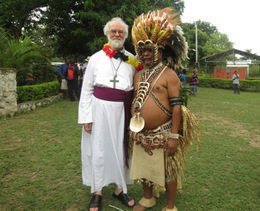
Wednesday 24th October 2012
The Archbishop of Canterbury, Dr Rowan Williams, is visiting Papua New Guinea from 19-24 October, at the invitation of the Anglican Church of Papua New Guinea.Speaking in advance of his visit the Archbishop said:
“I am delighted to be visiting Papua New Guinea and to be able to experience at first-hand the remarkable life of the church in this nation and its contribution to the wider community. We much look forward to celebrating the faithful Christian witness and dedicated service of the church among different communities and to seeing for ourselves the church’s central role in health, education and community development. We also look forward to experiencing how the enduring assets of the country’s rich culture and strong social fabric allow a confident response to the challenges of the day. There is so much in the life of the church and nation which is a gift for the wider church and for the world.
I look forward to discussions with church leaders from the different churches and with national leaders over the nation’s priorities for its people. I am very grateful to the Government of Papua New Guinea for its hospitality and its support.”
Saturday
Archbishop Williams and his wife, Dr Jane Williams, arrived in Port Moresby early on Saturday morning to a joyous welcome from Archbishop Joseph Kopapa and other leaders of the Anglican Church of Papua New Guinea and from government representatives. As the sun rose over the hills around the capital, colourful welcome dances gave Archbishop Rowan a first taste of the country’s rich and varied culture.
After their arrival at Port Moresby, known locally as the Gateway to Papua New Guinea, the Archbishop and Mrs Williams were welcomed by the Governor General, Sir Michael Ogio, on behalf of the government and people. The Governor General commended the work of the church and its development of local leadership and expressed appreciation that the Archbishop’s visit would connect with the life of local communities in the areas he would visit. They discussed the importance of values in society and the need for developing mature citizens with a clear sense of priorities for the nation and of mutual responsibility for one another.
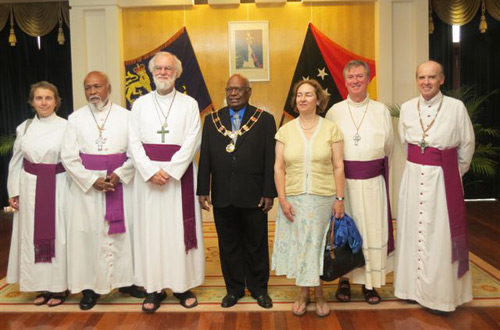
The Acting Prime Minister, H.E. Leo Dion, welcomed the Archbishop in the Prime Minister’s absence, and expressed the government’s commitment to work with the church in providing services to the community, acknowledging the important contribution made by the church, both spiritual and physical. The Archbishop welcomed such collaboration and warmly affirmed the government’s work to promote universal education.
In the evening, church families of the Diocese of Port Moresby, together with Bishop Peter Ramsden and Mother Sue Ramsden, gave the Archbishop and Mother Jane a festive welcome at the Diocese’s compound at Begabari, presenting beautiful handicrafts specially made for the visitors.
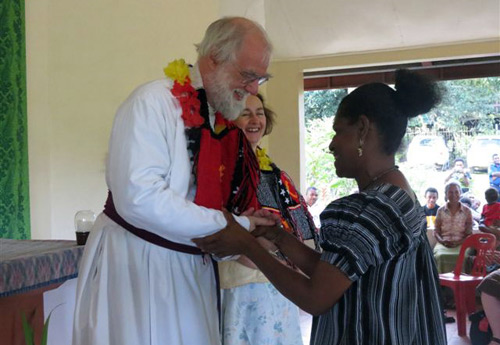
All joined together for a simple service of Evening Prayer in the beautiful Chapel of the Good Shepherd, a chapel with no walls and no need of patterned windows as it looks out on to the lush tropical gardens in which everyone then participated in a delicious shared meal. Impromptu singing by the local Melanesian Brothers rounded off a fine evening of fellowship on the first day of the visit.
Addressing the gathered clergy and church families, the Archbishop expressed his gratitude for all he would receive on his visit:
“To visit the churches of the Anglican Communion gives not only the chance to bring the good news but also to hearing and sharing the good news. I look forward to learning what God is doing in you and through you in this country.”
Sunday
On Sunday at dawn, the Archbishop of Canterbury flew over mist-shrouded mountains and deep green forested valleys to Popondetta in Oro (Northern) Province to receive a full-blown welcome from not only from Bishop Lindsley Ihove and the faithful of Popondota Diocese but also the assembled bishops and their wives from the five dioceses of the Anglican Church of Papua New Guinea.
Travelling around PNG is logistically very challenging. It was a great joy that Bishop Allan Migi had been able to reach Popondetta from the New Guinea Islands, and that Bishop Nathan Ingen, Bishop of Aipo Rongo, had been able to travel from the Highlands. For the bishops’ wives it was their first time to be able to meet together and much exchange of news and contacts was possible at the same time as offering a fine welcome to Dr Jane Williams, known locally by the title Mother Archbishop.
Flowers and branches were strewn along the road from Popondetta airport to the Cathedral of the Resurrection. There was singing at the roadside from pupils of the church’s Martyrs’ School, where proud memories still run deep from Prince Charles short sojourn there on a school exchange. Enthusiastic cries of “Oro!” meaning welcome, surrounded the Archbishop and his party as they disembarked the vehicles to be led into the Cathedral compound by a magnificent group of Tufi dancers, clad in spectacular feathered headdresses, traditional tapa cloth made from beaten bark, and adorned with copious necklaces of shells. Before entering the Cathedral, the Archbishop was presented with a set of stunning vestments, made by the clergy wives from traditional patterned cloth, which he wore for the Eucharist as the principal con-celebrant and preacher.
In his sermon, Archbishop Rowan talked of the sacrificial self-giving love of Christ, invoking the example of the martyrs in Papua New Guinea during the Second World War, including Lucien Tapiedi whose statue stands above the West Door of Westminster Abbey. Reflecting on the heritage and culture of Papua New Guinea before the time of the missionaries, the Archbishop said, “Christ comes not to destroy what has been inherited but to fulfil everything in that tradition that is generous, merciful and life-giving.”
Concluding his sermon, the Archbishop said: “There is so much in the history of the Anglican Church here that is life-giving, generous and sacrificial, so many examples of leadership that has sought to serve and give. All your Anglican brothers and sisters throughout the world give thanks for what this church has offered to all of us in witness and prayer; and today we pray that all of us in the Anglican family may grow all the time in faithfulness to the example of the one who led his people by being a servant and rescued his people by putting his life at risk.”
Read the full text of the Archishop's sermon here
After the service, a reception was held in a traditionally thatched wooden dais and shelter constructed especially for the occasion. The Archbishop and Mrs Williams met the clergy and people of the diocese, including representatives from the various women’s movements, including the Mothers’Union, the Clergy Wives and the Girls’ Friendly Society. Upholding their outstanding commitment and service to church and community, Dr Jane Williams thanked all the women for their contribution and their role in the success of the visit and celebration.
Later in the afternoon, the Archbishop and Dr Jane Williams attended a youth rally in which the gathered young people demonstrated a profound celebration of their faith through talks, opportunities for prayer and in their singing. Archbishop Rowan addressed the rally on the spiritual growth of Christian persons as they grow in knowledge of God and of themselves. He spoke of the capacity of the Church to change the world by love, by prayer and by being the body of Christ on earth and of the Christian calling to have respect for everyone and to work for reconciliation.
Monday
This morning, Archbishop Joe Kopapa and Bishop Lindsley Ihove, Bishop of Popondota, took Archbishop Rowan and Jane Williams along the coast to Oro Bay. ‘Oro’ means welcome – and that was truly the flavour of the welcome the party received on arrival at the newly refurbished Anglican hospital in Oro Bay.
St Margaret’s Hospital has been upgraded from a health centre, to work in partnership with the government hospital in Popondetta, in serving the health needs of the coastal community. The Archbishop participated in a service of dedication of the new hospital, which will open shortly. He spoke with Sr Mildred Lasken, the medical director, who had trained in Archbishop Rowan’s homeland of Wales. He also met Deputy National Health Secretary, Dr Paison Dakulala and local MP Hon. Delilah Gore, one of three women recently elected to Parliament, both of whom emphasised the importance of church and state partnership. Also present were the team of international partners, including Russ Thomson, Project Director, and Revd John Deane, Executive Director of Anglican Board of Mission, Australia, who have worked with commitment to support the upgrading of the hospital. The Archbishop also read out a letter of greetings from Canterbury from 2 former nurses at Oro Bay, Srs Nancy and Eileen, to great applause.
Commending the extraordinary role of churches in Papua New Guinea and across the world in health service delivery, Archbishop Rowan declared:
"I am so grateful to be able to express in person the great pride and satisfaction which the Anglican Communion takes in the Anglican Church of PNG in its concern for well-being for the population. Health care is about persons - real persons made in the image of God. There is severe lost potential where the gifts of women have been lost or prevented from their fulfilment due to lack of health care. I applaud the personal vision and commitment represented in this place and encourage the whole community to be involved in this excellent example of where partnership between church and government is working."
On returning to Popondetta, the Archbishop was taken to the site of a new teacher training college. Responding to the rapidly expanding demands on the education system, the Anglican Church of Papua New Guinea has decided to convert a former training centre into a teacher training college just outside of Popondetta town. As with health care, the churches in Papua New Guinea have played a key role in the delivery of education. Archbishop Rowan and Jane participated in a ground-breaking ceremony to newly dedicate this work and planted a Modawa tree to signify a strong connection with the church's roots in the area.
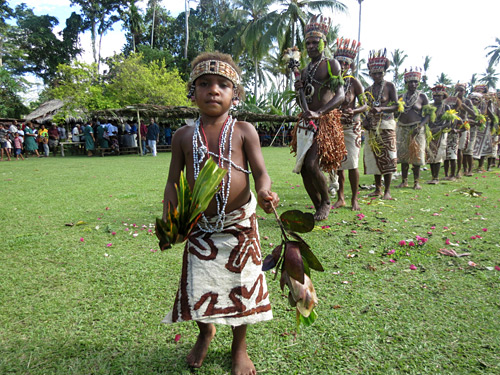
The Deputy Governor thanked the Anglican Church for this bold initiative and Archbishop Rowan expressed his pleasure at his involvement in this new beginning for teacher training, which offered "a true moral and spiritual vision of what human beings are."
Archbishop Rowan and Mrs Williams then visited the nearby wooded compound of the Society of St Francis and met with members of Papua New Guinea’s Anglican religious communities which include the Melanesian Brotherhood, The Society of Saint Francis, and the Congregation of the Sisters of the Visitation of our Lady.
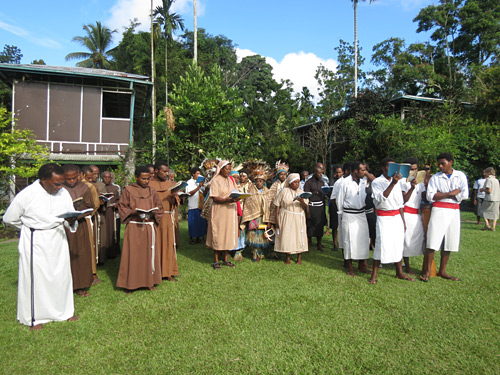
The Archbishop thanked communities for their inspiring witness and sacrificial service and for their joy in the Gospel. Together they enjoyed time of fellowship and drank deliciously fresh coconut water straight from coconuts grown in the compound.
The party then moved on to Newton Theological College where Archbishop Rowan and Jane Williams both addressed the staff and ordinands training for priesthood, offering their vision for theological education, before joining the college for an uplifting service of evening prayer with harmonious settings of the canticles and hymns, and sharing in a fellowship meal with staff and students with special dishes characteristic of the students own regions.
Tuesday
Archbishop visits Dogura, the birthplace of the Anglican Church of Papua New Guinea
Inaccessibility did not prevent the Archbishop of Canterbury from visiting Dogura in Milne Bay Province towards the Eastern extremity of Papua New Guinea. In glorious early morning sunshine Archbishop Williams, together with Archbishop Kopapa and their party, travelled by official government helicopter over dramatic coastal landscape ranging from dense mountainous rainforest and mangrove swamps to the folded green valleys of the Wedau-speaking communities. It was a very new experience for Bishop Clyde Igara, Bishop of Dogura, and his wife Mother Miriam to travel by helicopter to accompany Archbishop Rowan, it normally only being possible to reach Dogura by sea. It was on a beach close by that the first Anglican missionaries Albert Maclaren and Copland King landed in 1891 and the first Anglican chapel was constructed on the promontory of Dogura above. Since 1939 the majestic red-roofed Cathedral of St Peter and St Paul has stood sentinel on the Dogura plateau, becoming the mother church for more than a century of remarkable Christian witness and service which has spread across PNG.
Archbishop Rowan and Mother Jane were greeted and led by traditional Wedau dancers to the Cathedral for a joyful celebration of the Eucharist attended by pupils of Holy Name and St Paul’s Schools, the distinguished educational institutions of the Dogura mission. Archbishop Rowan celebrated and preached while Bishop Jonathan Merrick, Bishop of Lynn, brought greetings from Diocese of Norwich which has been linked in partnership since the time of the first Archbishop of PNG, David Hand, who himself came from that diocese.
Following the service the procession continued to the historic Modawa tree which had sprouted from one of the corner posts of the original Dogura chapel. Bishop Clyde explained how the Modawa tree represents not only the church’s beginnings but also its growth in many places into a church which now comprised five dioceses across the country.
Archbishop Rowan expressed his gratitude for the opportunity to see Dogura for himself:
“It is a huge joy for myself and for my party to see this unique and historic site where the seed of the gospel was planted. A seed was sown here which continues to grow and to bear fruit. I hope it may be a place of inspiration for the whole country. Growth in the church happens when the church does what it has got to do in the service of the community.”
The Deputy Governor, who had himself been educated in Dogura, paid tribute to the contribution of the Anglican Church in the area of education and health and commended the church’s readiness to provide these in places which others could not reach. He highlighted the importance of enhanced church / government partnership and of supporting an increase in church capacity in service delivery.
The Archbishop singled out the special contribution made by girls’ education, citing the impressive record of schools such as Holy Name School in Dogura:
“Women’s education has a crucial role for enabling the full rights of women and their full capacity as human beings. The same vision of eternal salvation which first brought people to Dogura is also a vision of human flourishing here and now.”
As the party prepared to depart for Port Moresby by helicopter before the weather and darkness closed in, local children performed a dramatic re-enactment of the time of Maclaren and King’s first arrival in Dogura and of the Gospel’s significant impact on the life of their communities.
Wednesday
Archbishop praises the church’s committed social action on final day in Port Moresby
Following an early morning Holy Eucharist with colleagues from the Diocese of Port Moresby, Archbishop Rowan met with members of the Papua New Guinea Anglican/Roman Catholic Commission. In conversation with its members, he heard about their committed and long-standing dialogue and friendship. This had borne fruit in the development and signing of a Covenant between the two churches in 2003 and the decision to do together whatever does not have to be done separately. Already there have been very tangible benefits for theological training and in formation for religious life, and it has offered opportunities for speaking together on particular issues. The Archbishop affirmed their example of deep ecumenical relations and the very positive model it offered for shared initiatives in other parts of the world.
Later in the morning, Archbishop Rowan and Dr Jane Williams were taken by Port Moresby Bishop Peter Ramsden to an urban settlement at Orobada, on the slopes of unallocated land beside the Air Training Centre, where the local church of Christ the King has itself started up an elementary school. The visitors met with the church leaders, teachers and students and enjoyed some lively songs and dancing from the children as well as pipe playing by the Melanesian Brothers serving in the parish. Archbishop and Mrs Williams met with local Mothers’ Union leader, Judith Warren, and members of the Mother and Child Support team, who shared their vision to provide women with the knowledge and skills needed for every mother and young girl to enjoy the life promised by God. Archbishop Rowan responded,
“It is so important to meet you and to see the difference you are making through the care of young children and women in this place. We all long for a society where everyone is precious, everyone is valuable and everyone has a part in the life God has given. Your work can make a change for the future so that women and children may rise into their full dignity as children of God, and as women of God, and show something of the kingdom of God in a more just, fair, loving and peaceful future.”
In the afternoon the Archbishop and Mrs Williams visited the Anglicare HIV Centre, which is based in the diocesan compound. Anglicare was the first institutional response to HIV in the country, and is held in high regard for its integrated services. In a private meeting with some of Anglicare’s clients, Archbishop Rowan and Jane Williams listened to personal testimonies from people living with HIV and learnt about issues of HIV and gender-based violence and how churches and communities are working together to respond. Archbishop Rowan was deeply moved by this encounter and later remarked, “Conversations about sexual health and about HIV/AIDS can seem difficult but in fact they need not be difficult. There is a need for all church communities to challenge stigma and discrimination. St Paul refers to a boldness and openness in speaking and this is what the churches need in speaking about this matter. There have been immense advances in treatment and in access to anti-retroviral drugs. There is more talking and the issue is now on the agenda of many more faith communities. HIV and AIDS is now something which can be lived with hopefully.”
The Archbishop was joined at Anglicare by members of the Church Leaders’ Alliance against HIV and representatives from the Government and United Nations. They discussed the work of the faith communities in responding to HIV and their commitment to work together to respond effectively to HIV and AIDS and to end gender-based and sexual violence. The Archbishop commended the example of this collaborative work, marking the importance of the churches’ bringing light and justice to difficult and painful social issues, saying, “We need the full weight of churches and of the voluntary sector. We need political will and medical and scientific resource, together with popular awareness of the challenges at hand. Treatment is not just about access to drugs but access to people: to counselling, friends and a mutual process of healing. All medical problems are human problems. I have been profoundly moved and impressed by what you do, and by the “humanizing” quality which as churches you bring to the struggle against this endemic situation.” The Archbishop warned that HIV was often embedded in cultures of violence, disrespect and abuse and called on all churches to examine whether they were doing enough to enable openness of speech and to awaken government to the challenges faced: “I trust and hope that all in the Christian community will step up to the challenge and work for a world which is safe for all.”
The visit to Papua New Guinea concluded with a formal dinner reception hosted by the Governor General at the national Parliament. Here the Archbishop and Mrs Williams met the Prime Minister and other national leaders and diplomatic representatives, including the Acting British High Commissioner, Jillian Battersby. In his speech, the Archbishop reflected on the rich encounters of his five day visit to Papua New Guinea, and on the deep willingness he had found everywhere to deploy the church’s skills, resources and energy for the most vulnerable of the community. Expressing his thanks to the Government and people of Papua New Guinea, he said, “I am carrying away the warmest possible memories as we leave. I offer specific gratitude to the government for the help given with our travel. Such help is one illustration of church and government willingness to work together for the good of all.”
Reflecting on the richness of this provincial visit, the last visit he will make as Archbishop of Canterbury, Dr Williams thanked the Archbishop, leaders and members of Anglican Church of Papua New Guinea for their joyful welcome and extraordinary witness. He concluded, “In a global situation where the world is in a fragile state, it is the challenge for the church to turn fragility into opportunity and to recognize more deeply our need for each other’s friendship and commitment and that of God. A sustainable, just global future depends on such trust accompanied by transparency, justness and fairness so that God’s purpose for creation and redemption may be honoured.”
A full transcript of the Archbishop's speech follows.
Speech at dinner reception hosted by the Governor-General, Papua New Guinea
24th October 2012
Your Excellency, Mr Prime Minister, Mr Speaker, Archbishop Joseph, Bishop Peter, members of Government and the Diplomatic Corp, distinguished guests:
On behalf of my wife and myself and our party from the United Kingdom, thank you for this evening’s event and for all the great generosity that has been shown to us as your guests in the last few days. We have been made to feel completely at home wherever we have been. We have been privileged to take part in the life of many local communities in this short time, and we shall be carrying away the warmest possible memories of Papua New Guinea as we leave tomorrow morning.
I want to express particular gratitude to the Government for facilitating our travel in the last few days, for helping us to move around easily in a country which is not without its challenges in terms of travelling from one part to another. We have been very well served, and I am deeply grateful for the help that’s been given.
But, as I have said in other contexts in recent days, that particular form of help is only one illustration of the principle which has again and again come before my eyes in this visit: and that is the willingness of Church and Government to work together here for the good of all. In the United Kingdom we have from time to time had our struggles over how Church and Government best work together. We have also had our struggles over whether or not international aid should be directed to Governments alone or to Governments in partnership with civil society and churches. Recently, we have had a very encouraging development in the United Kingdom, setting out a series of protocols and guidance for how our Department for International Development is to work with faith-based organisations, which is a major step forward in a co-operative vision. And as I said on another occasion the day before yesterday, I shall be able to take back to the United Kingdom the news that Papua New Guinea is setting a very good example in this.
In recent days, as you have heard, we have attended a variety of events and seen a variety of institutions: the opening of the St Margaret’s Hospital in Oro Bay, the ground-breaking ceremony for the new teacher training college near Popondetta. Also the work done by Anglicare here in Port Moresby, and the work that has being done in the ATS communities in the Parish of Christ the King, which we visited this morning. In all of these settings what I have seen is a deep and generous willingness on the part of the Anglican Church here to put its skills, its resources, and its energy unequivocally at the service not only of the community in general, but of the most vulnerable in the community. And that is precisely what the Church is there to do. Your Excellency, you have underlined the priority of the Church in advocating for the poor. But advocacy alone can be easy. Advocacy has to be combined with practical involvement, with sacrificial giving, and with long-term commitment. All of these things I believe the Anglican Church is ready and willing to offer in partnership with other agencies and in partnership with Government, so that this country, this society, will genuinely become more just and more secure.
There seems to be a very strong sense around at the moment of a change of climate; I don’t refer to the climate change, which is a major issue in this part of the globe as you and I, Prime Minister, were just discussing. I refer to a change in climate in expectations and hopes for politics in Papua New Guinea. There is a sense that there is fresh and deepened commitment to public transparency, a fresh and deepened commitment to universal education, to making up ground that has perhaps been lost in the last few decades. I can only applaud this new climate – this sense of a deeper commitment.
This is a country overwhelmingly well blessed with natural resources. It’s a country, as we’ve seen, richly blessed with human resources, and the challenge before Government here – perhaps even more acutely than in many other countries in the globe is to make the connection between that rich natural endowment and the prosperity and security of the population. I believe that commitment exists and it has been expressed very forcefully by many people in recent days, and I’ve heard it in conversation this evening. Making the connection between a wealth of natural resources and the actual well-being of a population is the noblest task that could be placed before any Government, and I use the word ‘noble’ advisedly. I believe we are called in politics to a noble task, a noble exercise. And it is the greatest possible tragedy for any country in the world when that nobility of the political calling is overlaid by suspicion, by cynicism, or by inaction. You, Prime Minister, and your Government have the extraordinary opportunity of revitalising that sense of the nobility of the political task ahead of you. I wish you the richest possible blessing and success in taking that forward. When expectations are high, pressures are heavy, and for that reason we shall pray for you and for your colleagues as you seek to take forward a vision for the people of this country.
In conclusion, a very brief word about our global situation at the moment. Our world is in a fragile state: fragile environmentally, fragile politically, fragile religiously. It’s a fragility that shows itself sometimes in local lawlessness and aimlessness. You are not unfamiliar with those problems here. It’s a fragility that shows itself in a certain kind of feverish atmosphere in public comment in the media. It’s a fragility that shows itself in a widespread lack of real confidence in the future. The challenge to which the Christian Church, like other religious bodies, seeks to rise is to turn that sense of fragility into a sense of opportunity. That is to say, when we recognise how vulnerable we all our in our world, we recognise more deeply how we need one another – one another’s friendship, one another’s faithful commitment – and how much we need trust in the faithful commitment of God to his people. A sustainable, just, global future depends on that trust and that confidence. Whether in the United Kingdom or in Papua New Guinea, we are called to that global vision, that sustainable global vision which is inseparable from the building of trust between people, with the transparency, the justice, the fairness that that entails. We are committed to that not for any particular local gain or transient success, but so that God’s will and purpose in creation and redemption will be honoured. That is why the Church is here to serve, to challenge, to question, to encourage the whole of society – including its political component – so that we all may all keep moving towards the human goal that God sets before us.
In these recent days we have seen vividly illustrated how that can work in the communities of this country that are served by the Anglican Church. I know that other Churches likewise put their resources, their skill, and their vision at the service of the same goal, and I hope and I pray that, with one another, building up that solidarity and that mutual commitment and trust this country may continue on its road of development and be a great beacon of progress and security for the region and for the world. So may God bless you in all that you do here, and God bless Papua New Guinea And raise it to its place among the nations.
© Rowan Williams 2012
